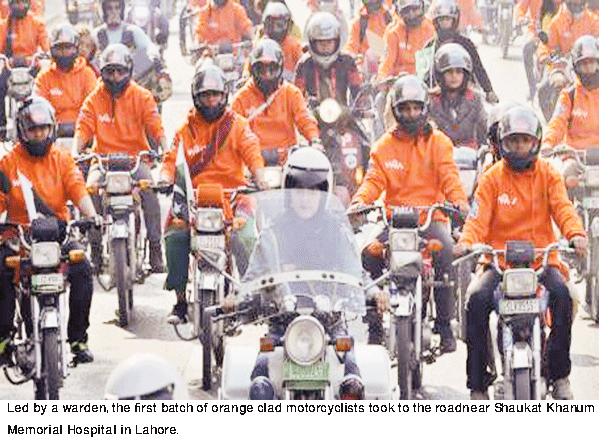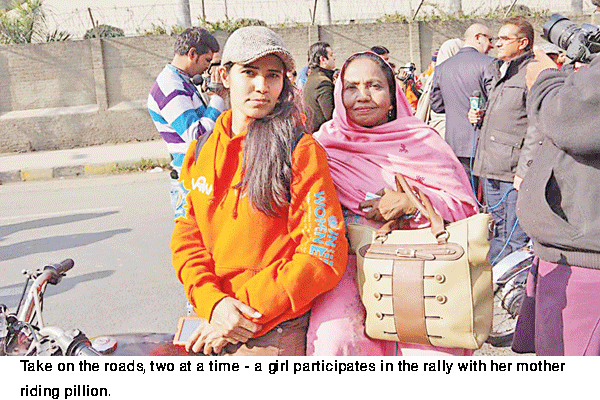Lahore There is so much that shareef gharanay ki larkian aren’t permitted to do in life. Whether it’s staying out after dark, traveling without a male companion, or simply loitering the streets like equal citizens, there’s a social stigma attached to being a woman in public spaces. Liberties that men take for granted are often hard fought victories for their female counterparts and in a country like Pakistan, patriarchal in its societal set up, there’s resistance against gender equality at every turn. So when initiatives like Women on Wheels (WoW) are introduced with government backing, there’s reason to rejoice.
InstepReport
A new initiative that trains women to ride motorbikes aims to help them reclaim public spaces and eradicate harassment by making them mobile.
Lahore
There is so much that shareef gharanay ki larkian aren’t permitted to do in life. Whether it’s staying out after dark, traveling without a male companion, or simply loitering the streets like equal citizens, there’s a social stigma attached to being a woman in public spaces. Liberties that men take for granted are often hard fought victories for their female counterparts and in a country like Pakistan, patriarchal in its societal set up, there’s resistance against gender equality at every turn. So when initiatives like Women on Wheels (WoW) are introduced with government backing, there’s reason to rejoice.
Starting in Lahore with CM Shabaz Sharif’s Special Monitoring Unit Law and Order (SMU) overseeing the project, WoW provides motorcycle training to women in a bid to help them regain mobility and tackle the taboo attached with being on the roads.
“If you think about it we’ve actually made a very daring move,” says Huda Wajih, the analyst at SMU heading the project. “Motorcycles are a very masculine symbol and are driven almost solely by the men in our country. By putting women on motorcycles and giving them the skills and confidence to ride on the road we’ve taken one giant leap towards bridging this gap.”
The project began enrollment last November, in a process that was purposely kept simple to encourage women to apply. “They only had to provide their name and CNIC number for registration at our office and later at the City Traffic Police Office in Thokar Niaz Baig. We called the women who had applied for the training program to an introductory session at the Traffic Police office and after that their training sessions started,” explains Rida Shehzad, an intern at SMU involved with the project. The training sessions commenced by separating women who knew how to cycle and those who needed to learn the basic balancing skills.
“It was actually a lot of fun,” Wajih states, having participated in the training program herself to learn the skill and gauge the effectiveness of the classes. “If someone didn’t know how to ride a cycle they’d teach them that first and after that the women would graduate on to motorbikes. Then the wardens (we had both, male and female present during the training) would help women familiarize with the levers and mechanics, and adjust to the weight of the bike by pushing it from behind as the women rode it without a running engine.”
 Depending on the ability of the trainee, the training lasted 15 days per person on average, held for an hour each day at times that were convenient for the women. The first batch turned out to be 150-women strong and the SMU wanted to ensure that the training didn’t remain just that by organizing a rally for its graduates in Lahore. “We wanted to host an event and formally announce this initiative as a serious drive, so we tested the first batch of graduates and nearly 70 of them were cleared of being road-worthy so they participated in the rally. We invited discerning members of the civil society like Asma Jehangir and Austrian Ambassador, Brigitta Balaha, to ride with the graduates and help us break this stigma that is not only misogynistic but also economically harmful to the country,” Wajih divulges.
Depending on the ability of the trainee, the training lasted 15 days per person on average, held for an hour each day at times that were convenient for the women. The first batch turned out to be 150-women strong and the SMU wanted to ensure that the training didn’t remain just that by organizing a rally for its graduates in Lahore. “We wanted to host an event and formally announce this initiative as a serious drive, so we tested the first batch of graduates and nearly 70 of them were cleared of being road-worthy so they participated in the rally. We invited discerning members of the civil society like Asma Jehangir and Austrian Ambassador, Brigitta Balaha, to ride with the graduates and help us break this stigma that is not only misogynistic but also economically harmful to the country,” Wajih divulges.
The training sessions continue and will do so till women require this service. The idea is to flood the roads with women on wheels, whether cycles (for which they’ve also received training as a by-product of this workshop) motorbikes or cars, till the sight of a female form hunched over cycle bars or steering wheels is no longer an anomaly. While all this is well and good, it doesn’t quite tackle the issue of harassment and a woman on a motorbike is far more vulnerable than one in a car, with proverbial walls around her. The SMU agrees and has an app under development that will allow women to send a distress signal to the nearest traffic warden.
“Harassment is the root cause we’re trying to address and we’re training wardens to take related complains seriously. The app under development will alert the warden and the harassed party need only provide license details to ensure that strict action is taken against the perpetrator,” Wajih further explains.
With similar social movements like Girls at Dhabas and the Pink Rickshaw scheme helping women reclaim public spaces through different platforms, WoW is testament to a changing sentiment. Yes, the fight for women is far from over and there are baser issues that plague our fight for equality but by becoming visible, by no longer believing that a girl’s place is at home, women are realizing the power of their presence. Not only do we have a voice, we’re now also willing to shout out as we zoom past you on a twin set of wheels.